POL101: Place of Women in Western Modern Political Thought Essay
VerifiedAdded on 2022/11/17
|8
|2333
|452
Essay
AI Summary
This essay examines the historical conceptualization of women within Western modern political thought, addressing how their place has been implicitly and explicitly defined. It explores key factors influencing women's political power, including institutions, structures, and capabilities, highlighting the impact of the public-private dichotomy and the exclusion of women from the political sphere. The essay discusses the influence of feminist theories and the challenges posed by male-dominated political structures and gender quotas. It argues that while gender quotas are important, they are insufficient without addressing broader socio-economic inequalities and promoting an enabling environment for women's effective political participation. The work draws on a range of sources to analyze the historical exclusion of women from political processes, the influence of democracy, and the need for a multifaceted strategy to empower women in the political arena, including economic and social justice.
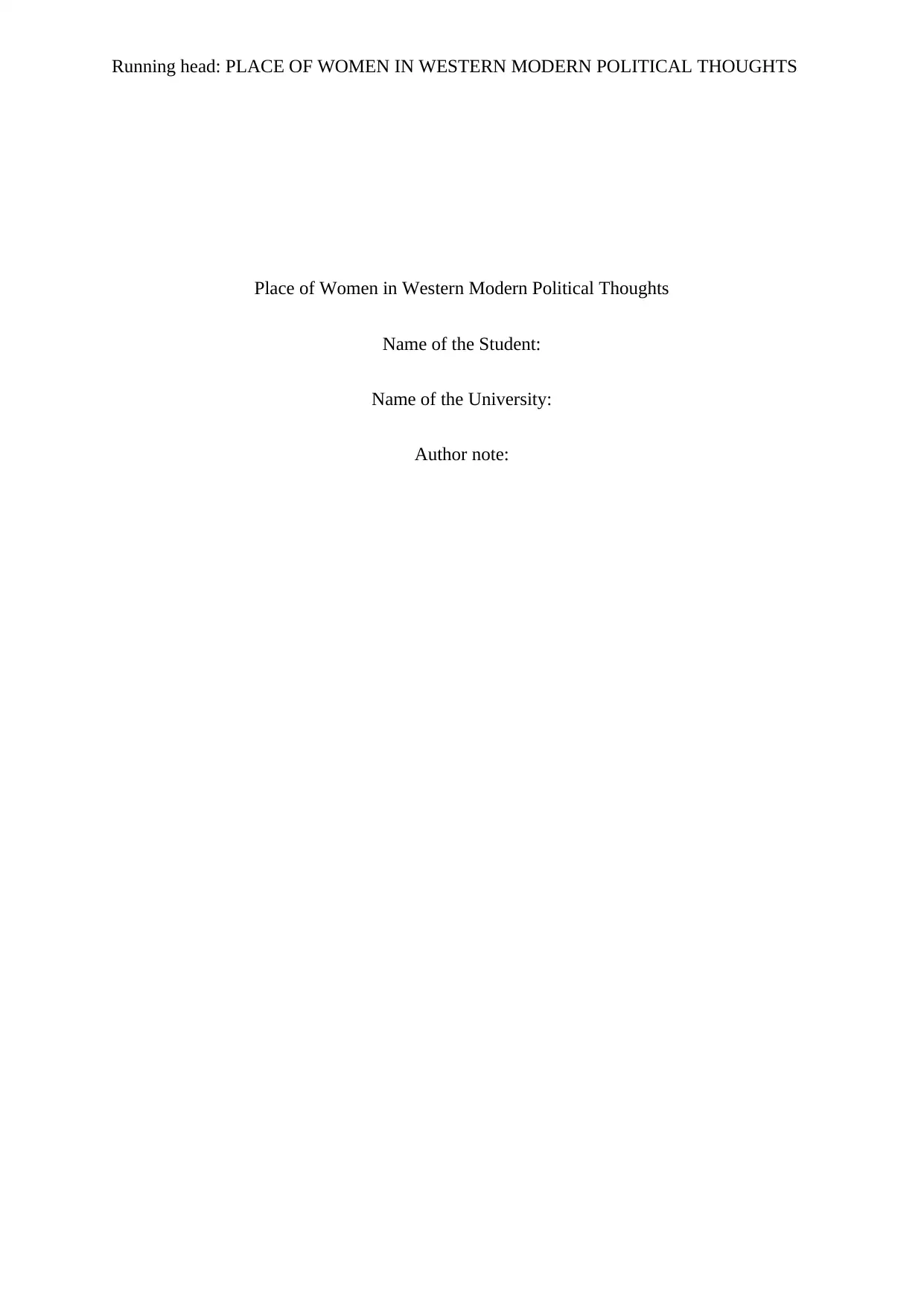
Running head: PLACE OF WOMEN IN WESTERN MODERN POLITICAL THOUGHTS
Place of Women in Western Modern Political Thoughts
Name of the Student:
Name of the University:
Author note:
Place of Women in Western Modern Political Thoughts
Name of the Student:
Name of the University:
Author note:
Paraphrase This Document
Need a fresh take? Get an instant paraphrase of this document with our AI Paraphraser
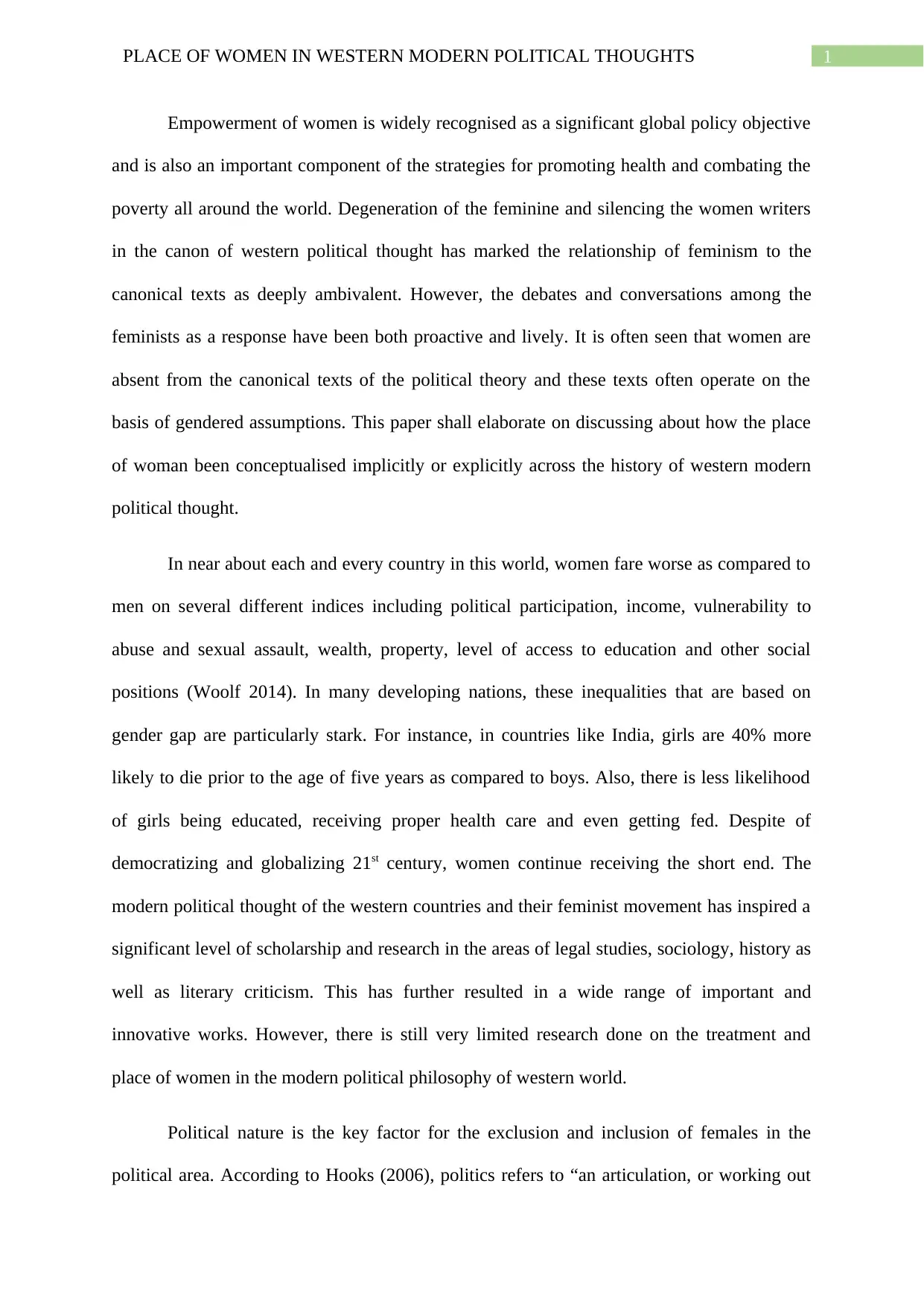
1PLACE OF WOMEN IN WESTERN MODERN POLITICAL THOUGHTS
Empowerment of women is widely recognised as a significant global policy objective
and is also an important component of the strategies for promoting health and combating the
poverty all around the world. Degeneration of the feminine and silencing the women writers
in the canon of western political thought has marked the relationship of feminism to the
canonical texts as deeply ambivalent. However, the debates and conversations among the
feminists as a response have been both proactive and lively. It is often seen that women are
absent from the canonical texts of the political theory and these texts often operate on the
basis of gendered assumptions. This paper shall elaborate on discussing about how the place
of woman been conceptualised implicitly or explicitly across the history of western modern
political thought.
In near about each and every country in this world, women fare worse as compared to
men on several different indices including political participation, income, vulnerability to
abuse and sexual assault, wealth, property, level of access to education and other social
positions (Woolf 2014). In many developing nations, these inequalities that are based on
gender gap are particularly stark. For instance, in countries like India, girls are 40% more
likely to die prior to the age of five years as compared to boys. Also, there is less likelihood
of girls being educated, receiving proper health care and even getting fed. Despite of
democratizing and globalizing 21st century, women continue receiving the short end. The
modern political thought of the western countries and their feminist movement has inspired a
significant level of scholarship and research in the areas of legal studies, sociology, history as
well as literary criticism. This has further resulted in a wide range of important and
innovative works. However, there is still very limited research done on the treatment and
place of women in the modern political philosophy of western world.
Political nature is the key factor for the exclusion and inclusion of females in the
political area. According to Hooks (2006), politics refers to “an articulation, or working out
Empowerment of women is widely recognised as a significant global policy objective
and is also an important component of the strategies for promoting health and combating the
poverty all around the world. Degeneration of the feminine and silencing the women writers
in the canon of western political thought has marked the relationship of feminism to the
canonical texts as deeply ambivalent. However, the debates and conversations among the
feminists as a response have been both proactive and lively. It is often seen that women are
absent from the canonical texts of the political theory and these texts often operate on the
basis of gendered assumptions. This paper shall elaborate on discussing about how the place
of woman been conceptualised implicitly or explicitly across the history of western modern
political thought.
In near about each and every country in this world, women fare worse as compared to
men on several different indices including political participation, income, vulnerability to
abuse and sexual assault, wealth, property, level of access to education and other social
positions (Woolf 2014). In many developing nations, these inequalities that are based on
gender gap are particularly stark. For instance, in countries like India, girls are 40% more
likely to die prior to the age of five years as compared to boys. Also, there is less likelihood
of girls being educated, receiving proper health care and even getting fed. Despite of
democratizing and globalizing 21st century, women continue receiving the short end. The
modern political thought of the western countries and their feminist movement has inspired a
significant level of scholarship and research in the areas of legal studies, sociology, history as
well as literary criticism. This has further resulted in a wide range of important and
innovative works. However, there is still very limited research done on the treatment and
place of women in the modern political philosophy of western world.
Political nature is the key factor for the exclusion and inclusion of females in the
political area. According to Hooks (2006), politics refers to “an articulation, or working out
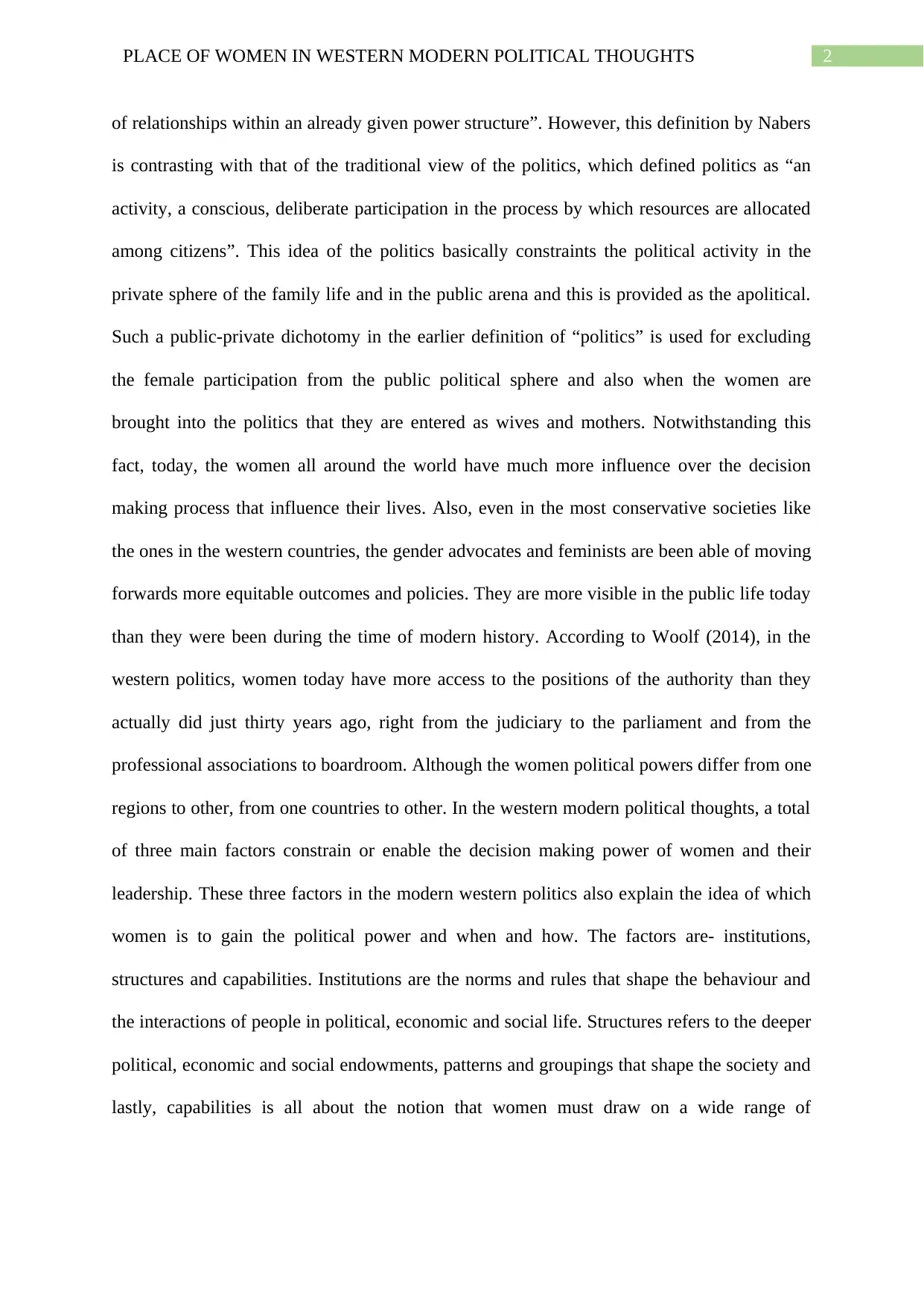
2PLACE OF WOMEN IN WESTERN MODERN POLITICAL THOUGHTS
of relationships within an already given power structure”. However, this definition by Nabers
is contrasting with that of the traditional view of the politics, which defined politics as “an
activity, a conscious, deliberate participation in the process by which resources are allocated
among citizens”. This idea of the politics basically constraints the political activity in the
private sphere of the family life and in the public arena and this is provided as the apolitical.
Such a public-private dichotomy in the earlier definition of “politics” is used for excluding
the female participation from the public political sphere and also when the women are
brought into the politics that they are entered as wives and mothers. Notwithstanding this
fact, today, the women all around the world have much more influence over the decision
making process that influence their lives. Also, even in the most conservative societies like
the ones in the western countries, the gender advocates and feminists are been able of moving
forwards more equitable outcomes and policies. They are more visible in the public life today
than they were been during the time of modern history. According to Woolf (2014), in the
western politics, women today have more access to the positions of the authority than they
actually did just thirty years ago, right from the judiciary to the parliament and from the
professional associations to boardroom. Although the women political powers differ from one
regions to other, from one countries to other. In the western modern political thoughts, a total
of three main factors constrain or enable the decision making power of women and their
leadership. These three factors in the modern western politics also explain the idea of which
women is to gain the political power and when and how. The factors are- institutions,
structures and capabilities. Institutions are the norms and rules that shape the behaviour and
the interactions of people in political, economic and social life. Structures refers to the deeper
political, economic and social endowments, patterns and groupings that shape the society and
lastly, capabilities is all about the notion that women must draw on a wide range of
of relationships within an already given power structure”. However, this definition by Nabers
is contrasting with that of the traditional view of the politics, which defined politics as “an
activity, a conscious, deliberate participation in the process by which resources are allocated
among citizens”. This idea of the politics basically constraints the political activity in the
private sphere of the family life and in the public arena and this is provided as the apolitical.
Such a public-private dichotomy in the earlier definition of “politics” is used for excluding
the female participation from the public political sphere and also when the women are
brought into the politics that they are entered as wives and mothers. Notwithstanding this
fact, today, the women all around the world have much more influence over the decision
making process that influence their lives. Also, even in the most conservative societies like
the ones in the western countries, the gender advocates and feminists are been able of moving
forwards more equitable outcomes and policies. They are more visible in the public life today
than they were been during the time of modern history. According to Woolf (2014), in the
western politics, women today have more access to the positions of the authority than they
actually did just thirty years ago, right from the judiciary to the parliament and from the
professional associations to boardroom. Although the women political powers differ from one
regions to other, from one countries to other. In the western modern political thoughts, a total
of three main factors constrain or enable the decision making power of women and their
leadership. These three factors in the modern western politics also explain the idea of which
women is to gain the political power and when and how. The factors are- institutions,
structures and capabilities. Institutions are the norms and rules that shape the behaviour and
the interactions of people in political, economic and social life. Structures refers to the deeper
political, economic and social endowments, patterns and groupings that shape the society and
lastly, capabilities is all about the notion that women must draw on a wide range of
⊘ This is a preview!⊘
Do you want full access?
Subscribe today to unlock all pages.

Trusted by 1+ million students worldwide
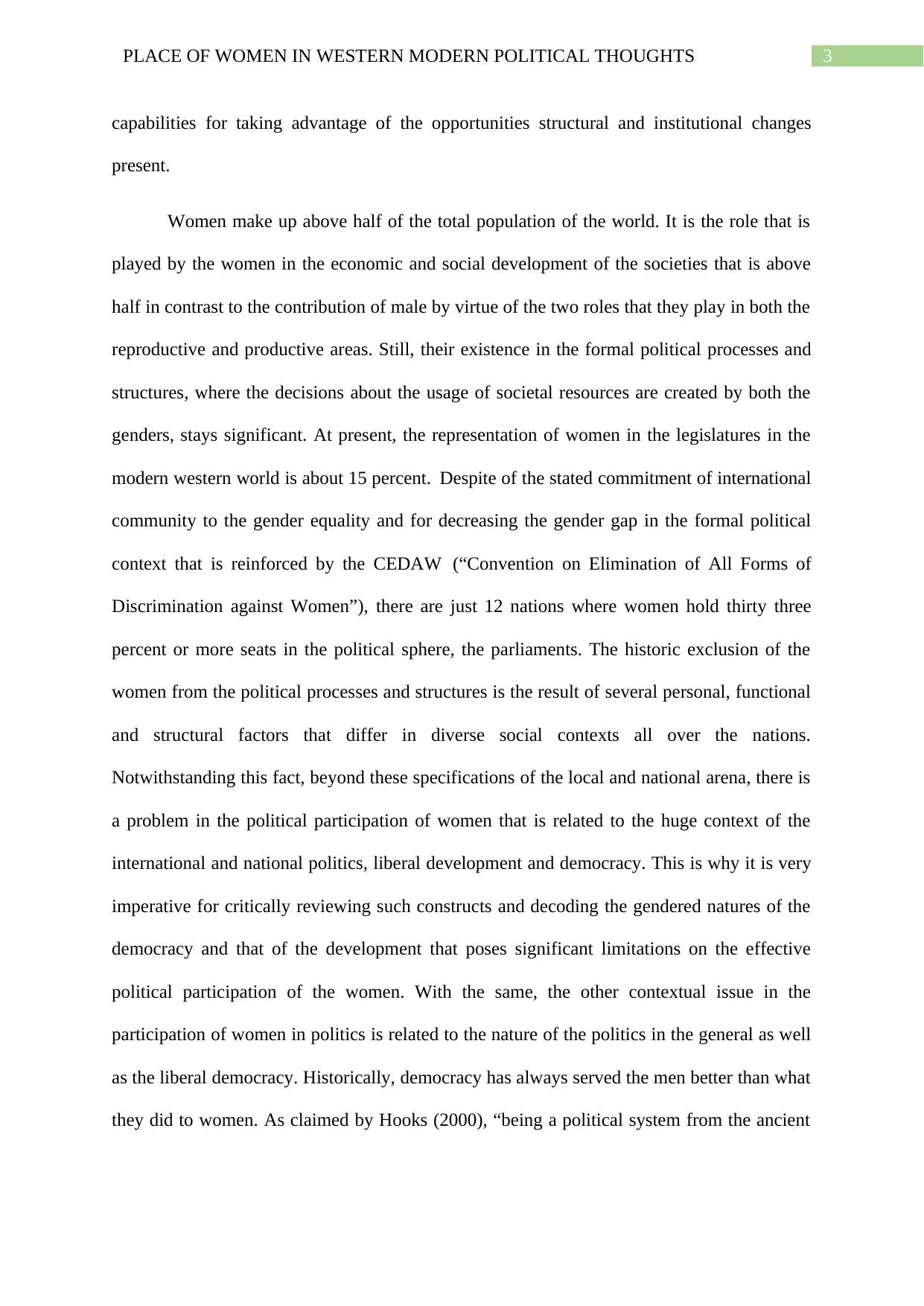
3PLACE OF WOMEN IN WESTERN MODERN POLITICAL THOUGHTS
capabilities for taking advantage of the opportunities structural and institutional changes
present.
Women make up above half of the total population of the world. It is the role that is
played by the women in the economic and social development of the societies that is above
half in contrast to the contribution of male by virtue of the two roles that they play in both the
reproductive and productive areas. Still, their existence in the formal political processes and
structures, where the decisions about the usage of societal resources are created by both the
genders, stays significant. At present, the representation of women in the legislatures in the
modern western world is about 15 percent. “Despite of the stated commitment of international
community to the gender equality and for decreasing the gender gap in the formal political
context that is reinforced by the CEDAW” (“Convention on Elimination of All Forms of
Discrimination against Women”), there are just 12 nations where women hold thirty three
percent or more seats in the political sphere, the parliaments. The historic exclusion of the
women from the political processes and structures is the result of several personal, functional
and structural factors that differ in diverse social contexts all over the nations.
Notwithstanding this fact, beyond these specifications of the local and national arena, there is
a problem in the political participation of women that is related to the huge context of the
international and national politics, liberal development and democracy. This is why it is very
imperative for critically reviewing such constructs and decoding the gendered natures of the
democracy and that of the development that poses significant limitations on the effective
political participation of the women. With the same, the other contextual issue in the
participation of women in politics is related to the nature of the politics in the general as well
as the liberal democracy. Historically, democracy has always served the men better than what
they did to women. As claimed by Hooks (2000), “being a political system from the ancient
capabilities for taking advantage of the opportunities structural and institutional changes
present.
Women make up above half of the total population of the world. It is the role that is
played by the women in the economic and social development of the societies that is above
half in contrast to the contribution of male by virtue of the two roles that they play in both the
reproductive and productive areas. Still, their existence in the formal political processes and
structures, where the decisions about the usage of societal resources are created by both the
genders, stays significant. At present, the representation of women in the legislatures in the
modern western world is about 15 percent. “Despite of the stated commitment of international
community to the gender equality and for decreasing the gender gap in the formal political
context that is reinforced by the CEDAW” (“Convention on Elimination of All Forms of
Discrimination against Women”), there are just 12 nations where women hold thirty three
percent or more seats in the political sphere, the parliaments. The historic exclusion of the
women from the political processes and structures is the result of several personal, functional
and structural factors that differ in diverse social contexts all over the nations.
Notwithstanding this fact, beyond these specifications of the local and national arena, there is
a problem in the political participation of women that is related to the huge context of the
international and national politics, liberal development and democracy. This is why it is very
imperative for critically reviewing such constructs and decoding the gendered natures of the
democracy and that of the development that poses significant limitations on the effective
political participation of the women. With the same, the other contextual issue in the
participation of women in politics is related to the nature of the politics in the general as well
as the liberal democracy. Historically, democracy has always served the men better than what
they did to women. As claimed by Hooks (2000), “being a political system from the ancient
Paraphrase This Document
Need a fresh take? Get an instant paraphrase of this document with our AI Paraphraser
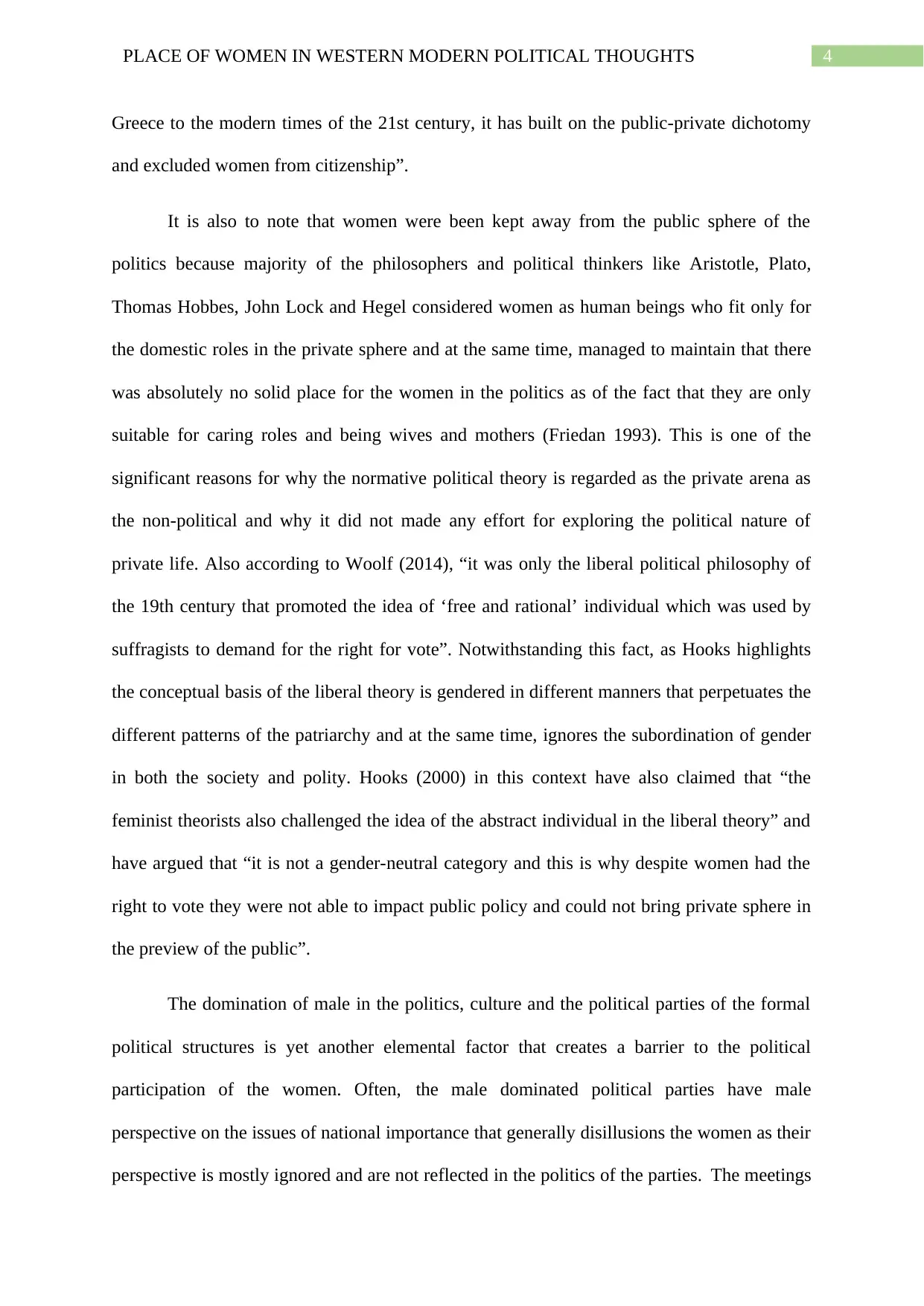
4PLACE OF WOMEN IN WESTERN MODERN POLITICAL THOUGHTS
Greece to the modern times of the 21st century, it has built on the public-private dichotomy
and excluded women from citizenship”.
It is also to note that women were been kept away from the public sphere of the
politics because majority of the philosophers and political thinkers like Aristotle, Plato,
Thomas Hobbes, John Lock and Hegel considered women as human beings who fit only for
the domestic roles in the private sphere and at the same time, managed to maintain that there
was absolutely no solid place for the women in the politics as of the fact that they are only
suitable for caring roles and being wives and mothers (Friedan 1993). This is one of the
significant reasons for why the normative political theory is regarded as the private arena as
the non-political and why it did not made any effort for exploring the political nature of
private life. Also according to Woolf (2014), “it was only the liberal political philosophy of
the 19th century that promoted the idea of ‘free and rational’ individual which was used by
suffragists to demand for the right for vote”. Notwithstanding this fact, as Hooks highlights
the conceptual basis of the liberal theory is gendered in different manners that perpetuates the
different patterns of the patriarchy and at the same time, ignores the subordination of gender
in both the society and polity. Hooks (2000) in this context have also claimed that “the
feminist theorists also challenged the idea of the abstract individual in the liberal theory” and
have argued that “it is not a gender-neutral category and this is why despite women had the
right to vote they were not able to impact public policy and could not bring private sphere in
the preview of the public”.
The domination of male in the politics, culture and the political parties of the formal
political structures is yet another elemental factor that creates a barrier to the political
participation of the women. Often, “the male dominated political parties have male
perspective on the issues of national importance that generally disillusions the women as their
perspective is mostly ignored and are not reflected in the politics of the parties.” The meetings
Greece to the modern times of the 21st century, it has built on the public-private dichotomy
and excluded women from citizenship”.
It is also to note that women were been kept away from the public sphere of the
politics because majority of the philosophers and political thinkers like Aristotle, Plato,
Thomas Hobbes, John Lock and Hegel considered women as human beings who fit only for
the domestic roles in the private sphere and at the same time, managed to maintain that there
was absolutely no solid place for the women in the politics as of the fact that they are only
suitable for caring roles and being wives and mothers (Friedan 1993). This is one of the
significant reasons for why the normative political theory is regarded as the private arena as
the non-political and why it did not made any effort for exploring the political nature of
private life. Also according to Woolf (2014), “it was only the liberal political philosophy of
the 19th century that promoted the idea of ‘free and rational’ individual which was used by
suffragists to demand for the right for vote”. Notwithstanding this fact, as Hooks highlights
the conceptual basis of the liberal theory is gendered in different manners that perpetuates the
different patterns of the patriarchy and at the same time, ignores the subordination of gender
in both the society and polity. Hooks (2000) in this context have also claimed that “the
feminist theorists also challenged the idea of the abstract individual in the liberal theory” and
have argued that “it is not a gender-neutral category and this is why despite women had the
right to vote they were not able to impact public policy and could not bring private sphere in
the preview of the public”.
The domination of male in the politics, culture and the political parties of the formal
political structures is yet another elemental factor that creates a barrier to the political
participation of the women. Often, “the male dominated political parties have male
perspective on the issues of national importance that generally disillusions the women as their
perspective is mostly ignored and are not reflected in the politics of the parties.” The meetings
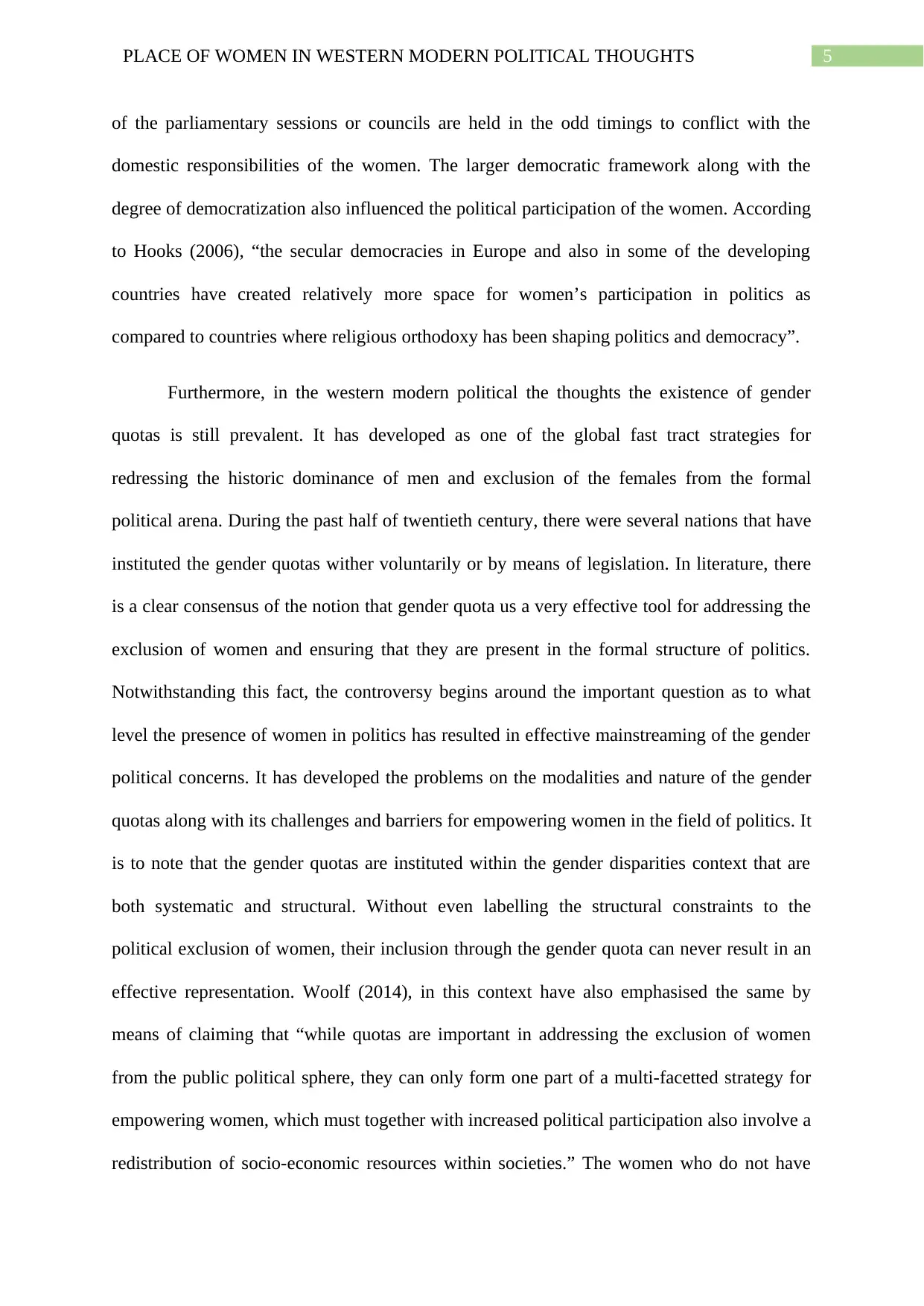
5PLACE OF WOMEN IN WESTERN MODERN POLITICAL THOUGHTS
of the parliamentary sessions or councils are held in the odd timings to conflict with the
domestic responsibilities of the women. The larger democratic framework along with the
degree of democratization also influenced the political participation of the women. According
to Hooks (2006), “the secular democracies in Europe and also in some of the developing
countries have created relatively more space for women’s participation in politics as
compared to countries where religious orthodoxy has been shaping politics and democracy”.
Furthermore, in the western modern political the thoughts the existence of gender
quotas is still prevalent. It has developed as one of the global fast tract strategies for
redressing the historic dominance of men and exclusion of the females from the formal
political arena. During the past half of twentieth century, there were several nations that have
instituted the gender quotas wither voluntarily or by means of legislation. In literature, there
is a clear consensus of the notion that gender quota us a very effective tool for addressing the
exclusion of women and ensuring that they are present in the formal structure of politics.
Notwithstanding this fact, the controversy begins around the important question as to what
level the presence of women in politics has resulted in effective mainstreaming of the gender
political concerns. It has developed the problems on the modalities and nature of the gender
quotas along with its challenges and barriers for empowering women in the field of politics. It
is to note that the gender quotas are instituted within the gender disparities context that are
both systematic and structural. Without even labelling the structural constraints to the
political exclusion of women, their inclusion through the gender quota can never result in an
effective representation. Woolf (2014), in this context have also emphasised the same by
means of claiming that “while quotas are important in addressing the exclusion of women
from the public political sphere, they can only form one part of a multi-facetted strategy for
empowering women, which must together with increased political participation also involve a
redistribution of socio-economic resources within societies.” The women who do not have
of the parliamentary sessions or councils are held in the odd timings to conflict with the
domestic responsibilities of the women. The larger democratic framework along with the
degree of democratization also influenced the political participation of the women. According
to Hooks (2006), “the secular democracies in Europe and also in some of the developing
countries have created relatively more space for women’s participation in politics as
compared to countries where religious orthodoxy has been shaping politics and democracy”.
Furthermore, in the western modern political the thoughts the existence of gender
quotas is still prevalent. It has developed as one of the global fast tract strategies for
redressing the historic dominance of men and exclusion of the females from the formal
political arena. During the past half of twentieth century, there were several nations that have
instituted the gender quotas wither voluntarily or by means of legislation. In literature, there
is a clear consensus of the notion that gender quota us a very effective tool for addressing the
exclusion of women and ensuring that they are present in the formal structure of politics.
Notwithstanding this fact, the controversy begins around the important question as to what
level the presence of women in politics has resulted in effective mainstreaming of the gender
political concerns. It has developed the problems on the modalities and nature of the gender
quotas along with its challenges and barriers for empowering women in the field of politics. It
is to note that the gender quotas are instituted within the gender disparities context that are
both systematic and structural. Without even labelling the structural constraints to the
political exclusion of women, their inclusion through the gender quota can never result in an
effective representation. Woolf (2014), in this context have also emphasised the same by
means of claiming that “while quotas are important in addressing the exclusion of women
from the public political sphere, they can only form one part of a multi-facetted strategy for
empowering women, which must together with increased political participation also involve a
redistribution of socio-economic resources within societies.” The women who do not have
⊘ This is a preview!⊘
Do you want full access?
Subscribe today to unlock all pages.

Trusted by 1+ million students worldwide
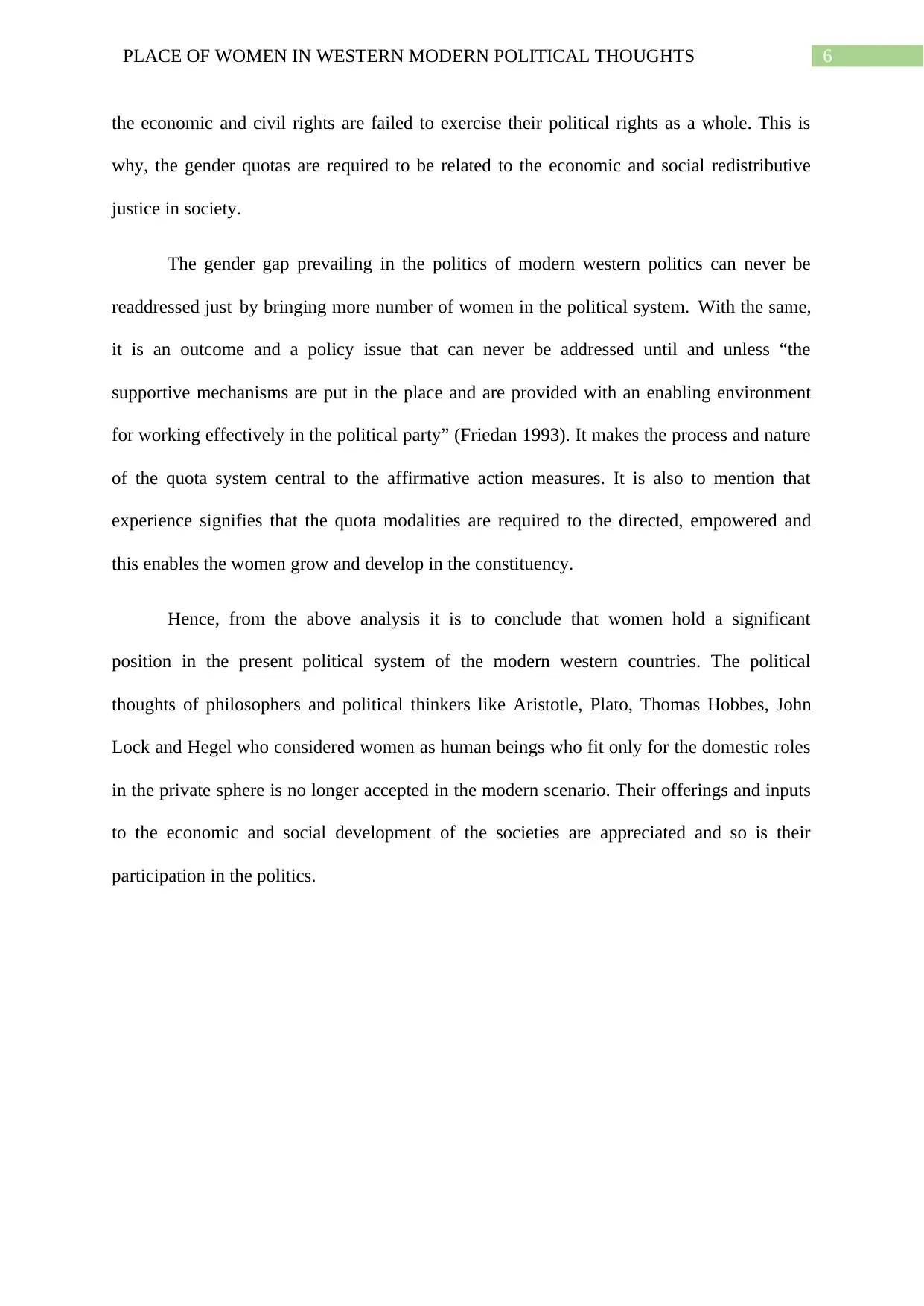
6PLACE OF WOMEN IN WESTERN MODERN POLITICAL THOUGHTS
the economic and civil rights are failed to exercise their political rights as a whole. This is
why, the gender quotas are required to be related to the economic and social redistributive
justice in society.
The gender gap prevailing in the politics of modern western politics can never be
readdressed just “by bringing more number of women in the political system.” With the same,
it is an outcome and a policy issue that can never be addressed until and unless “the
supportive mechanisms are put in the place and are provided with an enabling environment
for working effectively in the political party” (Friedan 1993). It makes the process and nature
of the quota system central to the affirmative action measures. It is also to mention that
experience signifies that the quota modalities are required to the directed, empowered and
this enables the women grow and develop in the constituency.
Hence, from the above analysis it is to conclude that women hold a significant
position in the present political system of the modern western countries. The political
thoughts of philosophers and political thinkers like Aristotle, Plato, Thomas Hobbes, John
Lock and Hegel who considered women as human beings who fit only for the domestic roles
in the private sphere is no longer accepted in the modern scenario. Their offerings and inputs
to the economic and social development of the societies are appreciated and so is their
participation in the politics.
the economic and civil rights are failed to exercise their political rights as a whole. This is
why, the gender quotas are required to be related to the economic and social redistributive
justice in society.
The gender gap prevailing in the politics of modern western politics can never be
readdressed just “by bringing more number of women in the political system.” With the same,
it is an outcome and a policy issue that can never be addressed until and unless “the
supportive mechanisms are put in the place and are provided with an enabling environment
for working effectively in the political party” (Friedan 1993). It makes the process and nature
of the quota system central to the affirmative action measures. It is also to mention that
experience signifies that the quota modalities are required to the directed, empowered and
this enables the women grow and develop in the constituency.
Hence, from the above analysis it is to conclude that women hold a significant
position in the present political system of the modern western countries. The political
thoughts of philosophers and political thinkers like Aristotle, Plato, Thomas Hobbes, John
Lock and Hegel who considered women as human beings who fit only for the domestic roles
in the private sphere is no longer accepted in the modern scenario. Their offerings and inputs
to the economic and social development of the societies are appreciated and so is their
participation in the politics.
Paraphrase This Document
Need a fresh take? Get an instant paraphrase of this document with our AI Paraphraser
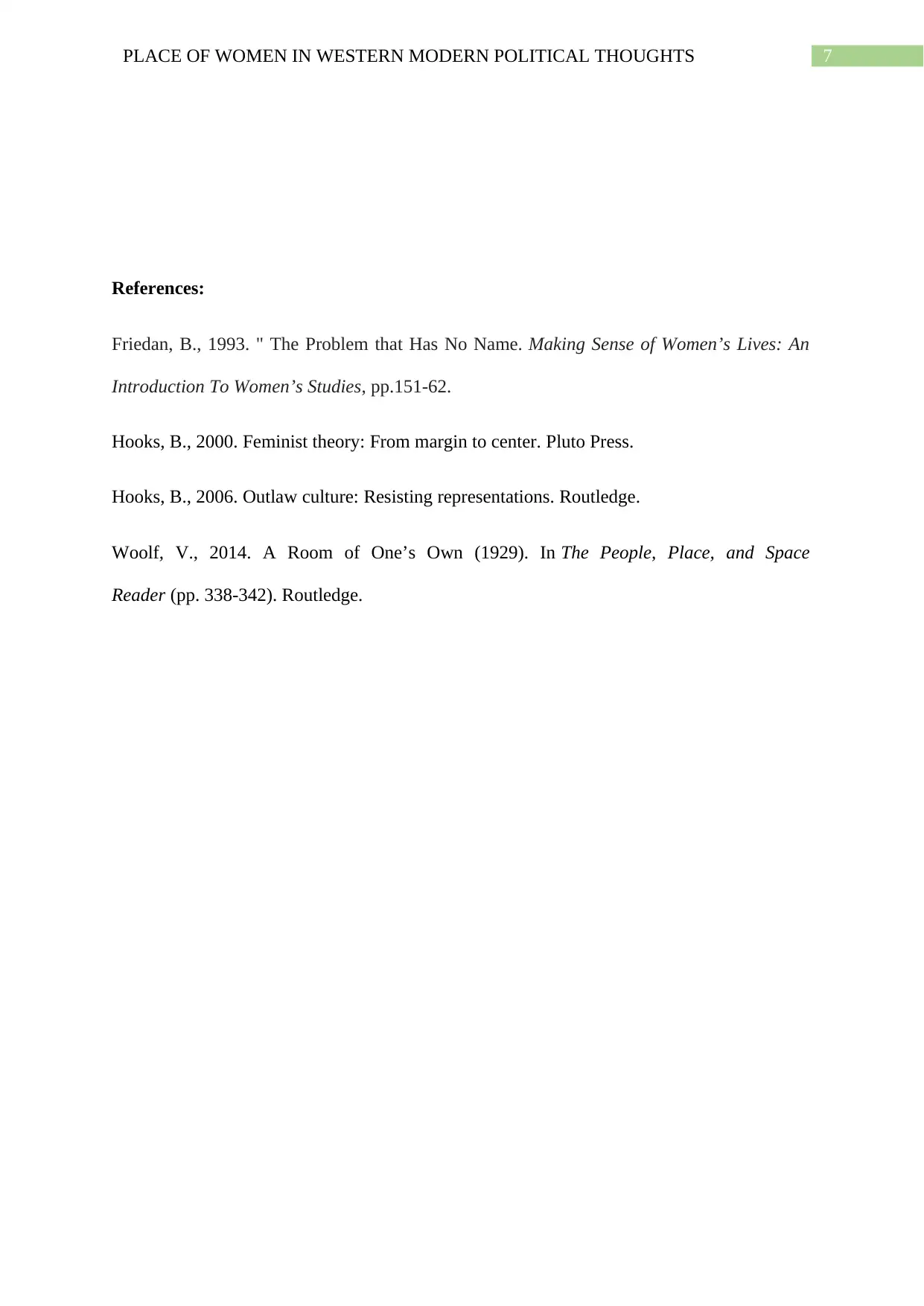
7PLACE OF WOMEN IN WESTERN MODERN POLITICAL THOUGHTS
References:
Friedan, B., 1993. " The Problem that Has No Name. Making Sense of Women’s Lives: An
Introduction To Women’s Studies, pp.151-62.
Hooks, B., 2000. Feminist theory: From margin to center. Pluto Press.
Hooks, B., 2006. Outlaw culture: Resisting representations. Routledge.
Woolf, V., 2014. A Room of One’s Own (1929). In The People, Place, and Space
Reader (pp. 338-342). Routledge.
References:
Friedan, B., 1993. " The Problem that Has No Name. Making Sense of Women’s Lives: An
Introduction To Women’s Studies, pp.151-62.
Hooks, B., 2000. Feminist theory: From margin to center. Pluto Press.
Hooks, B., 2006. Outlaw culture: Resisting representations. Routledge.
Woolf, V., 2014. A Room of One’s Own (1929). In The People, Place, and Space
Reader (pp. 338-342). Routledge.
1 out of 8
Related Documents
Your All-in-One AI-Powered Toolkit for Academic Success.
+13062052269
info@desklib.com
Available 24*7 on WhatsApp / Email
![[object Object]](/_next/static/media/star-bottom.7253800d.svg)
Unlock your academic potential
Copyright © 2020–2026 A2Z Services. All Rights Reserved. Developed and managed by ZUCOL.





